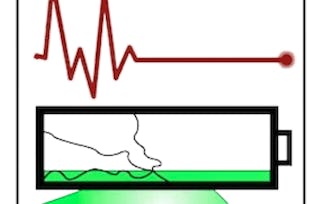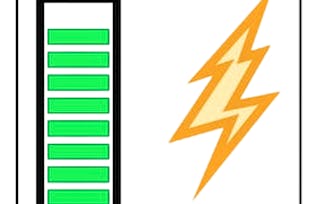Dans ce cours, vous apprendrez à mettre en œuvre différentes méthodes d'estimation de l'état de charge et à évaluer leurs mérites relatifs. A la fin du cours, vous serez capable de :


Acquérir des compétences de haut niveau avec Coursera Plus pour 199 $ (régulièrement 399 $). Économisez maintenant.


Estimation de l'état de charge de la batterie (SOC)
Ce cours fait partie de Spécialisation Algorithmes pour les systèmes de gestion des batteries
Enseigné en Français (doublage IA)

Instructeur : Gregory Plett
20 771 déjà inscrits
Inclus avec
(254 avis)
Ce que vous apprendrez
Comment mettre en œuvre des estimateurs d'état de charge (SOC) pour les cellules de batteries lithium-ion ?
Compétences que vous acquerrez
- Catégorie : Puissance électrique
- Catégorie : Simulation et logiciels de simulation
- Catégorie : Optimisation des performances
- Catégorie : Évaluation de modèles
- Catégorie : Modélisation mathématique
- Catégorie : Pensée informatique
- Catégorie : Probabilité
- Catégorie : Estimation
Détails à connaître

Ajouter à votre profil LinkedIn
37 devoirs
Découvrez comment les employés des entreprises prestigieuses maîtrisent des compétences recherchées

Élaborez votre expertise du sujet
- Apprenez de nouveaux concepts auprès d'experts du secteur
- Acquérez une compréhension de base d'un sujet ou d'un outil
- Développez des compétences professionnelles avec des projets pratiques
- Obtenez un certificat professionnel partageable

Il y a 7 modules dans ce cours
Cette semaine, vous apprendrez quelques définitions rigoureuses nécessaires pour discuter de l'estimation du SOC et quelques méthodes simples mais médiocres pour estimer le SOC. Pour apprendre de meilleures méthodes, nous passerons en revue les concepts de la théorie des probabilités qui sont nécessaires pour pouvoir traiter l'impact des bruits incertains sur l'état interne d'un système et sur les mesures effectuées par un système de gestion des bâtiments.
Inclus
8 vidéos16 lectures7 devoirs1 sujet de discussion1 laboratoire non noté
Cette semaine, vous apprendrez à dériver les étapes de la solution d'inférence probabiliste séquentielle gaussienne, qui est la base de tous les estimateurs d'état de type filtre de Kalman. Bien que ce contenu soit très théorique, il est important d'avoir une solide compréhension de base de ces sujets dans la pratique, puisque les applications réelles violent souvent certaines des hypothèses qui sont faites dans la dérivation, et nous devons comprendre l'implication que cela a sur le processus. À la fin de la semaine, vous saurez comment dériver le filtre de Kalman linéaire.
Inclus
6 vidéos6 lectures6 devoirs
Les étapes d'un filtre de Kalman peuvent sembler abstraites et mystérieuses. Cette semaine, vous apprendrez différentes façons de penser et de visualiser le fonctionnement du filtre de Kalman linéaire afin d'avoir une meilleure intuition de son fonctionnement. Vous apprendrez également à implémenter un filtre de Kalman linéaire dans le code Octave et à évaluer les sorties du filtre de Kalman.
Inclus
7 vidéos7 lectures7 devoirs2 laboratoires non notés
Un filtre de Kalman linéaire peut être utilisé pour estimer l'état interne d'un système linéaire. Mais les cellules de batterie sont des systèmes non linéaires. Cette semaine, vous apprendrez comment approximer les étapes de la solution d'inférence probabiliste séquentielle gaussienne pour les systèmes non linéaires, ce qui donne le "filtre de Kalman étendu" (EKF). Vous apprendrez à implémenter l'EKF dans le code Octave et à utiliser l'EKF pour estimer l'état des cellules de la batterie.
Inclus
8 vidéos8 lectures7 devoirs3 laboratoires non notés
L'EKF est le filtre de Kalman non linéaire le plus connu et le plus utilisé. Cependant, il présente certaines limites fondamentales qui restreignent ses performances pour les systèmes "très non linéaires". Cette semaine, vous apprendrez à dériver le filtre de Kalman à point sigma (parfois appelé "filtre de Kalman non accentué") à partir des étapes d'inférence probabiliste séquentielle gaussienne. Vous apprendrez également à implémenter ce filtre dans le code Octave et à l'utiliser pour estimer l'état des cellules d'une batterie.
Inclus
7 vidéos7 lectures6 devoirs2 laboratoires non notés
Le filtrage de Kalman exige que les bruits aient une moyenne nulle. Que faire si le capteur de courant présente une erreur de biais en courant continu, comme c'est souvent le cas ? Comment pouvons-nous mettre en œuvre des estimateurs SOC de type filtre de Kalman d'une manière efficace sur le plan informatique pour un bloc-batterie comprenant de nombreuses cellules ? Cette semaine, vous apprendrez comment compenser l'erreur de biais du capteur de courant et comment mettre en œuvre la méthode bar-delta pour une meilleure efficacité de calcul. Vous découvrirez également la validation de bureau en tant qu'approche pour les tests initiaux et le réglage des algorithmes BMS.
Inclus
5 vidéos5 lectures4 devoirs1 laboratoire non noté
Vous avez déjà appris que les filtres de Kalman doivent être "réglés" en ajustant leurs matrices de covariance de bruit de processus, de bruit de capteur et d'estimation de l'état initial afin d'obtenir des performances acceptables dans une large gamme de scénarios d'exploitation. Ce dernier module de cours vous permettra d'acquérir de l'expérience dans le réglage manuel d'un EKF et d'un SPKF pour l'estimation du SOC.
Inclus
2 devoirs de programmation2 laboratoires non notés
Obtenez un certificat professionnel
Ajoutez ce titre à votre profil LinkedIn, à votre curriculum vitae ou à votre CV. Partagez-le sur les médias sociaux et dans votre évaluation des performances.
Préparer un diplôme
Ce site cours fait partie du (des) programme(s) diplômant(s) suivant(s) proposé(s) par University of Colorado Boulder. Si vous êtes admis et que vous vous inscrivez, les cours que vous avez suivis peuvent compter pour l'apprentissage de votre diplôme et vos progrès peuvent être transférés avec vous.¹
Instructeur

En savoir plus sur Génie électrique
 Statut : Essai gratuit
Statut : Essai gratuitUniversity of Colorado Boulder
 Statut : Essai gratuit
Statut : Essai gratuitUniversity of Colorado Boulder
 Statut : Essai gratuit
Statut : Essai gratuitUniversity of Colorado Boulder
 Statut : Essai gratuit
Statut : Essai gratuitUniversity of Colorado Boulder
Pour quelles raisons les étudiants sur Coursera nous choisissent-ils pour leur carrière ?




Avis des étudiants
254 avis
- 5 stars
79,92 %
- 4 stars
16,92 %
- 3 stars
1,96 %
- 2 stars
0,39 %
- 1 star
0,78 %
Affichage de 3 sur 254
Révisé le 28 nov. 2020
Sir Gregory plett is an excellent Professor Ever and thanks to Coursera for such valuable plateform.
Révisé le 14 avr. 2021
Excellent course, would be happy if those sigma points were explained too. But still got the main idea of sigma point and the steps to execute them.
Révisé le 23 févr. 2022
Useful to understand Kalman Filters and continue with the Battery Management System specialization.

Ouvrez de nouvelles portes avec Coursera Plus
Accès illimité à 10,000+ cours de niveau international, projets pratiques et programmes de certification prêts à l'emploi - tous inclus dans votre abonnement.
Faites progresser votre carrière avec un diplôme en ligne
Obtenez un diplôme auprès d’universités de renommée mondiale - 100 % en ligne
Rejoignez plus de 3 400 entreprises mondiales qui ont choisi Coursera pour les affaires
Améliorez les compétences de vos employés pour exceller dans l’économie numérique
Foire Aux Questions
Pour accéder aux supports de cours, aux devoirs et pour obtenir un certificat, vous devez acheter l'expérience de certificat lorsque vous vous inscrivez à un cours. Vous pouvez essayer un essai gratuit ou demander une aide financière. Le cours peut proposer l'option "Cours complet, pas de certificat". Cette option vous permet de consulter tous les supports de cours, de soumettre les évaluations requises et d'obtenir une note finale. Cela signifie également que vous ne pourrez pas acheter un certificat d'expérience.
Lorsque vous vous inscrivez au cours, vous avez accès à tous les cours de la spécialisation et vous obtenez un certificat lorsque vous terminez le travail. Votre certificat électronique sera ajouté à votre page Réalisations - de là, vous pouvez imprimer votre certificat ou l'ajouter à votre profil LinkedIn.
Oui, pour certains programmes de formation, vous pouvez demander une aide financière ou une bourse si vous n'avez pas les moyens de payer les frais d'inscription. Si une aide financière ou une bourse est disponible pour votre programme de formation, vous trouverez un lien de demande sur la page de description.
Plus de questions
Aide financière disponible,



